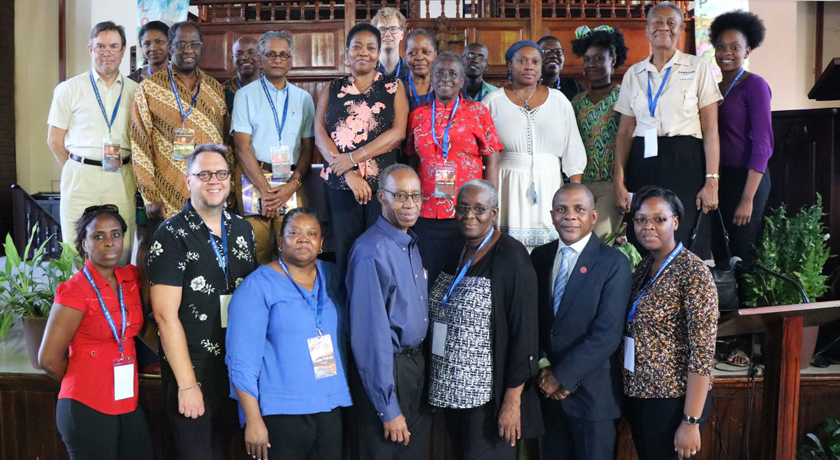 A project exploring the legacies of the transatlantic slave trade held its third hearing in Jamaica in February. The hearing was part of a series of four, launched by the Council for World Mission (CWM) on 12 November 2017. The first hearing was held in London, the heart of the British slave trading system. The second was held in Ghana, one of the lands where people were captured. Jamaica, location of the third hearing, was chosen because it was one of the countries where enslaved people were put to work on sugar plantations.
A project exploring the legacies of the transatlantic slave trade held its third hearing in Jamaica in February. The hearing was part of a series of four, launched by the Council for World Mission (CWM) on 12 November 2017. The first hearing was held in London, the heart of the British slave trading system. The second was held in Ghana, one of the lands where people were captured. Jamaica, location of the third hearing, was chosen because it was one of the countries where enslaved people were put to work on sugar plantations.
United Reformed Church members supporting the project include Mr Alan Yates, Moderator of the General Assembly, and the Revd Dr Michael Jagessar, Secretary for Global and Intercultural Ministries. Mr Yates reflects on the importance of the hearings.
London gave us the opportunity to understand how the enslaved people were traded like commodities. It also gave us an understanding of the wealth and privilege that developed from this horrific process. It even provided us with some insight into the complicity of the Christian churches. The hearing was a traumatic process for a white man to be involved in. However, my trauma cannot be compared to that of the enslaved Africans sold as chattel.
Jamaica afforded us the opportunity to meet with descendants of those enslaved and to understand some of their history and the legacies that they have had to deal with, and those that remain. To help us with our understanding we met with a number of knowledgeable witnesses: senior teaching staff and students from both the University of the West Indies (UWI) and the United Theological College of the West Indies, pastors and church members, and people from a Maroon community living in the mountains.
There were three main aspects of the witnesses’ accounts. Most students spoke of a sense of feeling ‘second rate’ because of the colour of their skin. This was a mixture of ‘internalised’ and external racism around what some call ‘skin-o-cracy’. This has been popularised across the Caribbean. A saying in Jamaica goes: ‘If you’re white you’re alright, if you’re brown stick aroun’ and if you’re black hang back’! Now, don’t get me wrong; these well-educated, articulate young people were not ‘defined’ by this sense of ‘second ratedness’, but it was, nonetheless, an issue. Given their education and backgrounds I was surprised that it still existed … clearly it does, and needs to be addressed.
Dr Horace Levy, a senior lecturer at UWI, painted us a picture of the deprivation that remains a legacy of slavery - and how this deprivation has spawned violence, Montego Bay having a murder rate 100 times that of New York. Professor Verene Shepherd, co-chair of the National Council on Reparation (Jamaica) and Vice Chair of the CARICOM Reparations Commission, explained their drive for restorative justice. And lastly, we heard from the Maroons, a community whose existence began when they escaped into the hills from the plantations. They have developed a self-governing and self-taxing community that is ferociously independent.
This was a very informative hearing with a focus on the descendants of the enslaved people. It is evident that those who have been able to take advantage of education are learning to love and respect their ‘blackness’, but there is some way to go.
The story is a bit different for those who suffer from deprivation. These communities ‘learn’ that the lighter your shade the better you are and that vicious circle must end. One of the ways to support ending the deprivation will be through restorative justice. For this, churches have an important role to play, starting with their theology and how this has been, and may be still be complicit, in the dehumanising of black and other bodies. In the next decade we are likely to hear the calls for reparation becoming much more strident.
The fourth hearing will be held in the United States later this year.
Picture: Second row: Mr Alan Yates, first from left, and the Revd Dr Michael Jagessar, third from left. ©Lynnette Li/CWM




